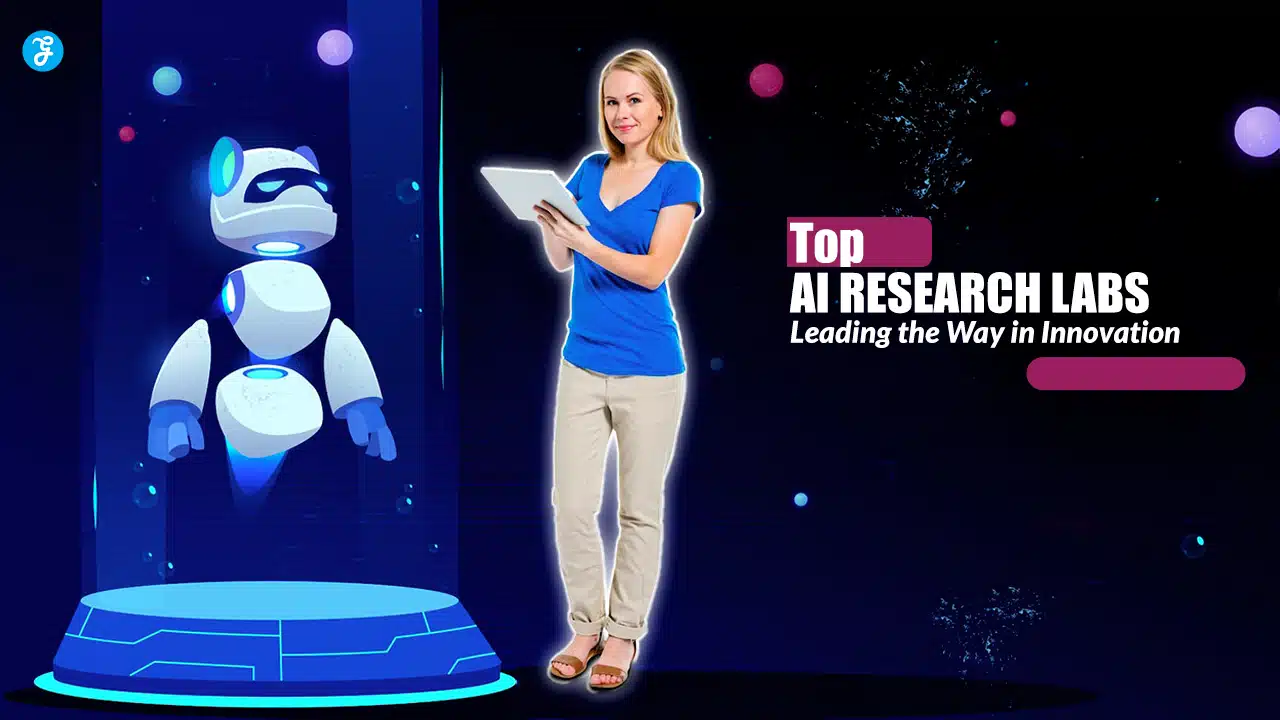Artificial Intelligence (AI) is driving transformative changes across industries, from healthcare to transportation, finance to entertainment.
Behind these advancements are cutting-edge AI research labs pushing the boundaries of what’s possible.
These labs are not only leading the way in developing new AI technologies but also contributing to fundamental research that addresses complex societal challenges.
In this article, we will explore 10 of the best AI research labs that are shaping the future of innovation.
1. OpenAI
OpenAI is one of the most recognized AI research organizations globally, founded with the mission to ensure that artificial general intelligence (AGI) benefits all of humanity.
Elon Musk, Sam Altman, and other tech visionaries founded the lab, which is both a for-profit and non-profit organization.
OpenAI’s work spans a variety of AI subfields, including natural language processing (NLP), reinforcement learning, and generative models.
Key Contributions
- GPT Series:
OpenAI is best known for its Generative Pretrained Transformer (GPT) models, including the groundbreaking GPT-3, which has revolutionized natural language generation and understanding.
- Reinforcement Learning:
Their research in reinforcement learning, such as training AI agents to master games like Dota 2, has pushed the limits of what machines can learn autonomously.
- AI Safety and Ethics:
OpenAI places a strong emphasis on ensuring AI is developed safely, contributing to the global conversation on AI ethics and regulation.
Why It’s Leading the Way
OpenAI’s approach to open research, its cutting-edge technologies like the GPT series, and its focus on AI safety make it one of the most influential AI labs in the world.
By sharing its research with the community, OpenAI is democratizing AI technology while striving to align AI development with human values.
2. Google DeepMind
DeepMind, acquired by Google in 2014, is one of the most innovative AI research labs, specializing in deep learning and reinforcement learning.
Its primary mission is to solve intelligence and use it to advance scientific discovery.
DeepMind’s interdisciplinary approach, combining AI with neuroscience, psychology, and economics, has set it apart from other research labs.
Key Contributions
- AlphaGo and AlphaZero:
DeepMind’s AlphaGo program famously defeated world champion Go player Lee Sedol in 2016, marking a pivotal moment in AI history.
AlphaZero extended this success by mastering chess, shogi, and Go without human input.
- Healthcare AI:
DeepMind is applying AI to healthcare by developing AI systems that can predict acute kidney injury and assist in diagnosing eye diseases.
- Protein Folding:
DeepMind’s AlphaFold AI system made a major breakthrough in predicting protein structures, addressing one of biology’s most challenging problems.
Why It’s Leading the Way
DeepMind’s achievements in reinforcement learning and their focus on using AI to solve real-world scientific problems have made it a leader in the AI research community.
The lab’s cross-disciplinary research and practical applications in healthcare and biology demonstrate its broad impact.
3. MIT-IBM Watson AI Lab
The MIT-IBM Watson AI Lab is a collaboration between the Massachusetts Institute of Technology (MIT) and IBM to advance fundamental AI research.
This partnership aims to develop AI technologies that can be applied across industries, including healthcare, cybersecurity, and urban planning.
The lab focuses on pushing the frontiers of deep learning, reasoning, and knowledge representation.
Key Contributions
- AI for Healthcare:
The lab has pioneered AI tools for improving diagnostics and patient care, including using AI to detect cancer in medical images.
- Adversarial AI:
Research in AI security, particularly in creating robust models that can defend against adversarial attacks, is a major focus area.
- AI and Human Collaboration:
The lab is developing AI systems that augment human intelligence rather than replace it, enabling new ways for AI and humans to collaborate effectively.
Why It’s Leading the Way
The MIT-IBM Watson AI Lab is at the forefront of creating AI technologies that address pressing global challenges.
Its research in adversarial AI and AI-human collaboration reflects the lab’s commitment to building AI that enhances rather than disrupts human capabilities.
4. Microsoft Research AI
Microsoft Research AI is the dedicated AI division of Microsoft Research, working on cutting-edge AI technologies across natural language processing, vision, and autonomous systems.
With a global presence, Microsoft’s AI research team focuses on fundamental research as well as the application of AI to products like Azure AI and Cortana.
Key Contributions
- AI for Accessibility:
Microsoft is developing AI tools to improve accessibility for people with disabilities, including Seeing AI, an app that narrates the world for visually impaired users.
- Project InnerEye:
This project uses AI to assist in medical image analysis, particularly in cancer treatment planning.
- Language Understanding:
Microsoft’s breakthroughs in language understanding, such as the Transformer models, have significantly improved translation services and chatbots.
Why It’s Leading the Way
Microsoft Research AI is a leader in applying AI to real-world challenges, particularly in healthcare and accessibility.
The lab’s combination of fundamental research and applied AI development makes it one of the most versatile AI research organizations globally.
5. Facebook AI Research (FAIR)
FAIR is Facebook’s dedicated AI research lab, focusing on advancing the field of AI through open collaboration and fundamental research.
Their work spans multiple areas, including computer vision, NLP, and robotics. FAIR emphasizes open science, making its research and tools available to the public.
Key Contributions
- PyTorch:
FAIR developed PyTorch, one of the most popular deep learning frameworks in the world, which is widely used in AI research and industry.
- Computer Vision:
FAIR has made significant advancements in computer vision, particularly in object recognition and segmentation, leading to improvements in Facebook’s core products like Instagram and Facebook.
- AI for Social Good:
FAIR is researching AI technologies that can assist in disaster response and misinformation detection, focusing on how AI can benefit society.
Why It’s Leading the Way
FAIR’s commitment to open research, its development of widely-used tools like PyTorch, and its work in social good applications make it a critical player in AI research.
By fostering collaboration and transparency, FAIR accelerates AI development across industries.
- Stanford Artificial Intelligence Laboratory (SAIL)
Stanford University’s SAIL is one of the most prestigious AI research labs in the world, with a long history of pioneering work in the field.
The lab focuses on foundational AI research across robotics, machine learning, computer vision, and NLP.
SAIL is also known for producing some of the top AI talent in the world.
Key Contributions
- Robotics and Autonomous Systems:
SAIL is a leader in robotics research, particularly in autonomous vehicles and robotic manipulation.
- Machine Learning:
SAIL has contributed extensively to machine learning theory and its practical applications in healthcare and autonomous systems.
- AI Education:
Stanford’s AI programs have trained many of the leading experts in AI today, contributing to the lab’s influence in both academia and industry.
Why It’s Leading the Way
SAIL’s impact on AI research spans decades, making it one of the most respected institutions in the field.
Its contributions to both the theoretical and practical aspects of AI, along with its educational role, position it as a leader in AI innovation.
7. Baidu Research
Baidu Research is the AI arm of Baidu, China’s leading search engine and AI company.
Baidu focuses on applying AI to various industries, including autonomous driving, natural language processing, and AI-powered healthcare solutions.
The lab is also known for its open-source AI platform, Paddle.
Key Contributions
- Apollo:
Baidu’s Apollo project is one of the world’s leading autonomous driving platforms, aimed at creating self-driving vehicles for the masses.
- PaddlePaddle:
Baidu’s open-source deep learning framework is widely used across industries, helping democratize AI tools for developers and researchers.
- AI-Powered Healthcare:
Baidu is developing AI tools to assist in medical diagnostics and healthcare management, leveraging NLP and computer vision.
Why It’s Leading the Way
Baidu Research’s leadership in autonomous driving and its commitment to open-source AI development make it a global leader.
The lab’s focus on applying AI to real-world challenges, particularly in healthcare and transportation, showcases its innovative approach to AI research.
8. Tencent AI Lab
Tencent AI Lab is a leading AI research institution in China, focusing on fundamental research and industrial applications of AI.
With over 200 researchers, the lab works on cutting-edge technologies in speech recognition, natural language processing, and computer vision.
Tencent AI Lab’s research also underpins many of Tencent’s core products, including WeChat.
Key Contributions
- AI in Gaming:
Tencent is a leader in using AI to enhance gaming experiences, from intelligent NPCs to AI-driven game development.
- NLP and Chatbots:
Tencent AI Lab has developed advanced NLP models that power chatbots and virtual assistants in WeChat.
- Medical AI:
The lab is also advancing AI in medical imaging and diagnostics, helping improve patient outcomes through AI-powered tools.
Why It’s Leading the Way
Tencent AI Lab’s contributions to both entertainment and healthcare illustrate its wide-ranging influence in the AI industry.
The lab’s focus on using AI to improve products and services that impact millions of people makes it a key player in the global AI landscape.
9. Allen Institute for Artificial Intelligence (AI2)
The Allen Institute for Artificial Intelligence (AI2), established by Paul Allen, a co-founder of Microsoft, is devoted to carrying out high-impact AI research with the aim of advancing AI for the general good.
AI2 focuses on several areas, including machine reasoning, computer vision, and natural language processing.
Key Contributions
- Semantic Scholar:
AI2 developed Semantic Scholar, an AI-powered search engine designed to help researchers find relevant academic papers faster and more efficiently.
- AI for Environmental Science:
AI2 is working on AI models that can help address climate change by improving predictions and creating more efficient energy systems.
- Machine Reasoning:
AI2 is a leader in machine reasoning, developing AI systems that can reason through complex tasks and provide explanations for their decisions.
Why It’s Leading the Way
AI2’s focus on AI for the public good, particularly in education and environmental science, sets it apart from other research labs.
Its commitment to advancing machine reasoning and creating tools that benefit society makes it a unique leader in AI research.
10. Berkeley Artificial Intelligence Research (BAIR)
The Berkeley Artificial Intelligence Research (BAIR) Lab at the University of California, Berkeley, is known for its cutting-edge research in deep learning, robotics, and reinforcement learning.
BAIR is a hub for some of the most innovative AI research, producing groundbreaking work that combines machine learning with robotics and control systems.
Key Contributions
- Robotics and Reinforcement Learning:
BAIR is at the forefront of combining AI with robotics, particularly in using reinforcement learning to teach robots how to interact with their environment.
- Generative Models:
BAIR has made significant advances in generative models, such as using AI to generate realistic images and videos.
- AI for Climate Science:
The lab is applying AI to climate science, developing models that can help predict environmental changes and mitigate the effects of climate change.
Why It’s Leading the Way
BAIR’s interdisciplinary research approach, combining AI with robotics and environmental science, positions it as a leader in AI innovation.
The lab’s focus on solving real-world problems using AI makes it one of the most forward-thinking AI research labs in the world.
Conclusion
These 10 AI research labs are at the forefront of innovation, each making significant contributions to the advancement of AI technology.
Whether through groundbreaking work in natural language processing, healthcare, robotics, or ethical AI, these institutions are shaping the future of AI and its impact on society.
By pushing the boundaries of what’s possible, these research labs are leading the way toward a smarter, more interconnected world.









































